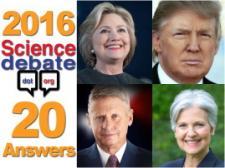Presidential Candidates on Science

ScienceDebate.org was launched in 2007 with a goal of promoting a Presidential debate entirely on scientific topics. That hasn't happened yet, but the organization, which includes a broad selection of establishment figures and is co-organized by the National Academies, AAAS, and the Council on Competitiveness, is still trying.
Meanwhile, they set a perhaps more realistic goal of agreeing on 20 science-related questions and getting written answers from the candidates. The answers from Hillary Clinton, Donald Trump and Jill Stein are now online. Libertarian Gary Johnson has not yet responded.
Here’s what you get from the candidates for each question (illustrated with extracts from responses to the opioid problem):
- From Clinton, three or four paragraphs that read as though they were drafted by a competent policy analyst and edited, or at least approved, by the candidate.
- Sample: "We must work with medical doctors and nurses across the country to treat this issue on the ground, from how patients are accessing these medications to how we are supporting them in recovery."
- Sample: "We must work with medical doctors and nurses across the country to treat this issue on the ground, from how patients are accessing these medications to how we are supporting them in recovery."
- From Trump, one paragraph that might have been extemporized by himself and then translated into a form of English.
- Sample: "As this is a national problem that costs America billions of dollars in productivity, we should apply the resources necessary to mitigate this problem."
- Sample: "As this is a national problem that costs America billions of dollars in productivity, we should apply the resources necessary to mitigate this problem."
- From Stein, short paragraphs (often several) that frequently make a lot of utopian sense.
- Sample: "We will end the 'war on drugs' and redirect funds presently budgeted for the 'war on drugs' toward expanded research, education, counseling and treatment."
The Center for Genetics and Society’s core concerns about human biotechnologies are not explicitly covered. There are no references in either the questions or the answers to germline or other gene editing, or to genomics, stem cells, eugenics or precision medicine, to name but a few. Privacy is mentioned only in the context of the Internet in general.
Press reactions are listed on-site. Science had an anodyne but reasonably accurate summary. Lawrence M. Krauss in the New Yorker took a wry approach. Trump’s contributions were dissected at length by Martin Longman at Washington Monthly, who calls them variously “straight unresponsive pablum,” “almost unbelievable,” showing “no clue” and, on nuclear power, “positively Palinesque.” (Read the whole thing!) Michael Schulman at The Cubit blog (part of Religion Dispatches) has an entertaining summary that accurately concludes:
ScienceDebate.org asked questions about forces that will affect the basic well-being and survival of the United States’ citizenry. In theory, that’s the stuff of democracy. Not one of them, though, felt like something that will even remotely sway the election.
At almost the same time, Neal Lane and colleagues at Rice University issued a report arguing strongly that the White House Office of Science and Technology Policy (OSTP) and the position of science adviser should be retained by the next president, who should, as Science notes, "lay out priorities for science and innovation within the first 100 days of taking office.” The report is not specific on issues, but very strong on process.
On the lighter side, there are reports that Trump intends to nominate Peter Thiel, the notorious billionaire transhumanist, to the Supreme Court. Everyone involved denies this on the record, but the rumor is said to derive from sources close to Mr. Thiel. Someone allegedly close to the candidate confirms (on background) that there has been discussion but cautions:
Trump’s offers often fail to materialize in real life.
Previously on Biopolitical Times:
- An Even Stranger Presidential Candidate
- Public Opposes Human Germline “Enhancement” by Overwhelming Majority
- The Third Rail of the CRISPR Moonshot: Minding the Germline
- RIP: Stem Cells in Politics (2002–2008)



